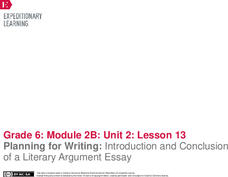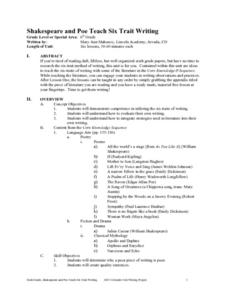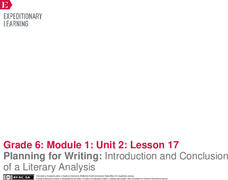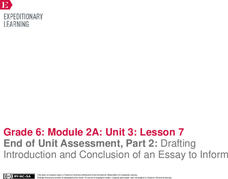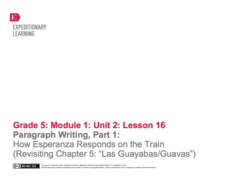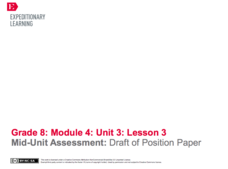Ohio Literacy Resource Center
Writing a Well-Structured Paragraph
Practice with paragraphs while thinking about careers! Learners examine and discuss two sample paragraphs, marking the different elements (topic sentences, body, concluding sentences), and try out writing their own paragraphs. Focusing...
EngageNY
Planning for Writing: Introduction and Conclusion of a Literary Argument Essay
Give a powerful introduction. Scholars analyze the introductory paragraph in the model essay "Are We Medieval?: Opportunities in the Middle Ages and Today." They discuss the key components the author includes and then walk through the...
Curated OER
Shakespeare and Poe Teach Six-Trait Writing
A Six-Trait Writing instructional activity helps your middle schoolers liven up their word choice and shows them how to evaluate their own writing. Class members take a close look at the language used in poems by Shakespeare, Kipling,...
EngageNY
Planning for Writing: Introduction and Conclusion of a Literary Analysis
It's all about the introduction. Scholars work on the introductory paragraph for their essays, connecting the theme of a myth and The Lightning Thief. They use a graphic organizer to help focus their work and then move to working on the...
EngageNY
Drafting Introduction and Conclusion
In conclusion ... Scholars analyze the model essay Adversity Faced by Townspeople in
the Middle Ages to gain a better understanding of introductory and concluding paragraphs. After studying the author's strategies, learners begin...
EngageNY
End of Unit Assessment, Part 2: Drafting Introduction and Conclusion of an Essay to Inform
A powerful introduction and conclusion can really pack a punch. Using the resource, scholars first read and discuss a model essay. Then, as part of the end of unit assessment, they draft the introductory and concluding paragraphs of...
EngageNY
Paragraph Writing, Part 1: How Esperanza Responds on the Train (Revisiting Chapter 5: "Las Guayabas/Guavas")
When your class members have completed the novel Esperanza Rising, they will be ready to write an expository essay on how Esperanza responds to events and what this says about her character. Set your pupils up for success by...
Curated OER
Stating Your Case: Writing Thesis Statements Effectively
As a writer, if you have a weak introductory paragraph or thesis statement, you might lose your audience! Have your middle and high schoolers practice writing introductory paragraphs that include clear thesis statements in response to...
EngageNY
Scaffolding for Position Paper: Clarifying Body Paragraphs, Introduction, and Conclusion
All clear! Scholars read through the body paragraphs of their position papers to ensure clarity. They also review their planners to make sure all information is paraphrased without plagiarism. When satisfied with the body paragraphs,...
Curated OER
Expository Writing (Informational Brochure)
Design an informational brochure to urge people to move to a specific community. The purpose of this activity is to expose pupils to expository writing. After creating the brochure, they write a three-paragraph persuasive or...
EngageNY
End of Unit On-Demand Informational Writing: Philo Farnsworth’s Invention of the Television and How It Changed People’s Lives, Part 2
Scholars complete the unit by finishing their end of the unit assessments. They arrange sentences for an introductory paragraph in the correct order, provide evidence for their thinking, and write a conclusion paragraph. They then...
EngageNY
Planning for Writing: Introduction and Conclusion of a Literary Analysis Essay
First and last impressions are important. Using the helpful resource, scholars draft the introductory and concluding paragraphs of their literary analysis essays. Next, they use a writing evaluation rubric to self-assess their work.
EngageNY
Mid-Unit Assessment: Completing My Draft Position Paper
What's the difference? Scholars analyze the similarities and differences between introductory and concluding paragraphs. Then, using a model essay as a guide, they write their draft position papers.
Curated OER
How to Write an Essay: Secondary ed.
Whether introducing the structure of expository essays or reviewing the format with your high schoolers, take the time to check out this resource. Examples of seven common forms of introductory paragraphs and six types of conclusions, as...
EngageNY
The Painted Essay for Opinion Writing: Developing a Conclusion and Adding Linking Words
Let's get colorful! Scholars use the Painted Essay technique to analyze and color code the conclusion of a model essay. Working in small groups, pupils then write a conclusion paragraph for their draft editorials about offshore...
Curated OER
Writing the Essay
Relate the structure of the essay to the structure of a building. The class compares an essay to a building, with the writer being the architect, the introduction being the foundation, and so on. They use the visual representation of a...
EngageNY
Mid-Unit Assessment: Draft of Position Paper
What is the purpose of an introduction and conclusion? Using the resource, scholars review the model position paper from activity one and discuss the author's choices. Next, they draft their position papers' introductory and concluding...
EngageNY
End of Unit Assessment, Part 2: Drafting Introduction and Conclusion of a Narrative
First and last impressions matter. Scholars compose the introductory and concluding sections of their narrative writing assignments. Also, to prepare for an upcoming performance task, pupils watch a modern-day monologue from the movie...
Curated OER
Use Details from Text to Identify Cause and Effect, Draw Conclusions, Compare and Contrast
Third graders discuss research topics and write a paragraph on one of the provided questions. They focus on including key words from charts that the class has been compiling. They underline supporting details within the text they write....
Nancy Fetzer's Literacy Connections
Expository Paragraph
Upper elementary and middle school writers learn how to craft an expository paragraph by following the six steps detailed in a 48-page instructional guide. Learners learn how to write six different types of informational paragraphs:...
Curated OER
Journeying to Create
Show a video clip that descripes how taking a journey can change a person's outlook on life. Learners write a paragraph about a place that uses imagery and tone to create a specfic effect. They evaluate their journal entries as well.
EngageNY
Speech Writing: Identifying Criteria for a High Quality Conclusion
Learning is never-ending. Scholars learn about effective conclusions as they continue watching a video of an opinion speech. After analyzing the speech's conclusion, they work in small groups to write an ending for their own speeches.
Curated OER
Persuasive Writing II
Help your young writers use logic in their persuasive writing. Discuss the characteristics of a persuasive paper, and have pupils work together to explore and solve a syllogism. They will write a short persuasive paper which includes a...
EngageNY
Paragraph Writing, Part II
Come up with a list of requirements for this expository essay on Esperanza's character in Esperanza Rising as a class and use the list to guide class writing. Here, learners will complete the first paragraph, discuss their notes for the...

